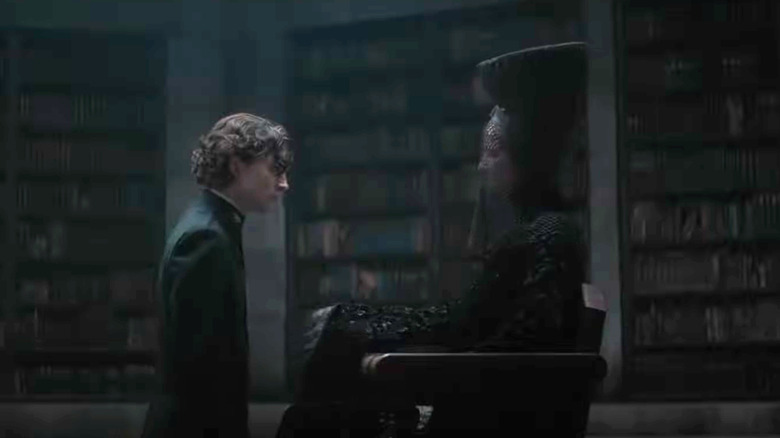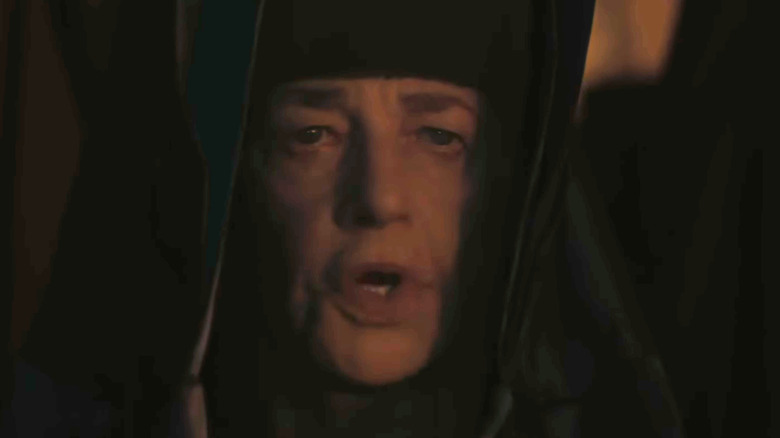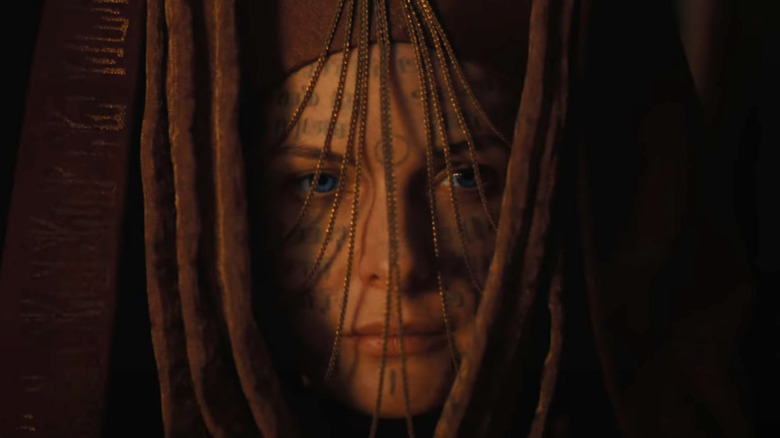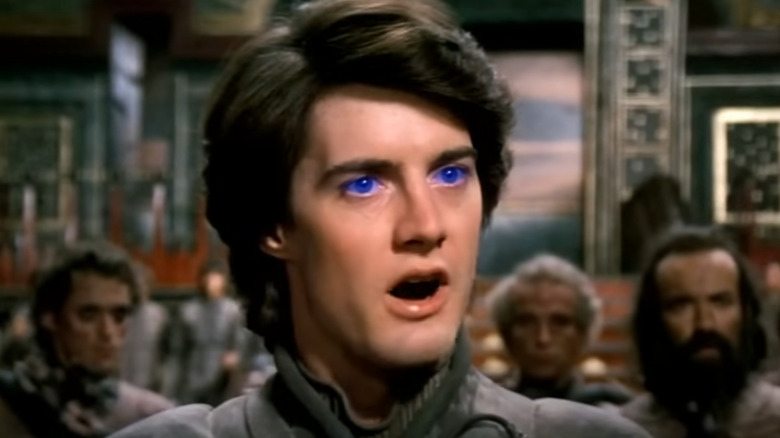What Is The Voice In Dune & Why Is It So Powerful?
Among the many concepts "Star Wars" kind of stole from the "Dune" books, there's the Voice. Folks who haven't read the "Dune" novels will recognize the idea as the equivalent of the Jedi mind trick in "Star Wars" ("These are not the droids you're looking for"), but in Frank Herbert's novels, the Voice is used primarily by the Bene Gesserit, a cult of women who are essentially witch nuns from space. The Voice can be used to override people's free will, so if someone who isn't trained to resist the Voice is trying to kill a Bene Gesserit with a knife, for instance, the sister can use the Voice to tell them, "Drop the knife." The assailant will usually do it, even if they know they shouldn't.
The Voice is usually used in a direct way, but there are moments throughout the books where a character will subtly use the Voice to get what they want; if you're listening to a highly-trained Bene Gesserit member talk with a lightened Voice, it can sometimes feel like they're just being very persuasive.
Like a lot of concepts in the "Dune" universe, the Voice is one of those things that sounds simple, but raises a ton of questions the moment you start really thinking about it. Luckily, author Frank Herbert himself was also wondering these questions, which is why the books mostly have all the answers you'd need.
How does someone learn the Voice?
Learning to do the Voice takes years of training, as we see with Paul Atreides when we first meet him in the book/movie. Even though Paul is incredibly gifted, going on to become the ultra-powerful Kwisatz Haderach, at 14 years old, he's still struggling to use the Voice effectively. When the book shifts into Jessica's point of view, she often remarks that his Voice attempts are clumsy, but she also seems to have little doubt that he'll get there eventually.
As for how exactly the Voice is taught? The details are sparse, but we're told it's a combination of years of voice training, sharpening one's observational skills, and a diet that includes regular helpings of the Spice Melange. Bene Gesserit training in general seems to prioritize keeping strong control over one's emotions and learning to read all the subtle signs of someone else's emotional state; this helps because part of making the Voice work is making sure you understand the psyche of your target. The more familiar you are with someone, the easier time you'll likely have with wielding the Voice on them.
Who can resist the Voice?
Just as the Bene Gesserit are trained to use the Voice, they're also trained to resist it. Even someone who was not raised in the Bene Gesserit ways, like fan-favorite Duncan Idaho, is capable of learning to ignore the Voice. In the second book, Paul trains Idaho (or rather, Idaho's ghola clone) by exposing him to the Voice as much as possible and letting him build up an immunity to it.
But although people can be trained to resist the Voice, it's still possible for a particularly powerful Bene Gesserit to overpower that training. We see this on display in one of the final moments of "Dune: Part Two," where Paul uses the Voice on the same Reverend Mother who used it on him at the beginning of the first film. The fact that he's capable of using the Voice on her shows just how far he's grown over the course of the story, and also makes clear to her that Paul has become the Kwisatz Haderach, a figure more powerful than anyone else in the universe.
For those who don't have any Bene Gesserit training, the best way to avoid the Voice is to prevent the person from speaking to you. Simple earplugs could probably do the trick, or you could gag the person so they can't talk. The latter is what the Harkonnens do to Jessica and Paul in Denis Villeneuve's first "Dune" movie, although they take it a step further and hire a deaf guy to guard them.
How does the Voice affect the world of Dune?
When writing the books, Frank Herbert didn't just come up with a bunch of cool superhuman abilities for his characters to have, he also put a lot of thought into how the existence of those abilities would impact society. The existence of the Voice means that being deaf is a genuinely useful quality for a security guard to have, and it also means that political rulers have an easier time manipulating the masses. It's not uncommon for characters in leadership positions (mainly Paul) to subtly use the Voice during his political speeches, quietly swaying the audience to his side with a mix of magic and persuasive rhetoric.
The Voice also contributes to a general widespread fear and distrust of the Bene Gesserit. When Paul and Jamis are having their dual to the death, the Fremen leader Stilgar essentially puts a gag order on Jessica for fear that she might speak with the Voice and influence the duel's outcome.
Jessica seems aware of this distrust, which is why she reflects in the book on how she's never once used the Voice on her husband, even subtly. She thinks about how she could've used it to influence his strategic decisions, but knew that to do so even once would be a violation of his trust and could potentially poison their relationship. The Bene Gesserit in general seem reluctant to use the Voice except in extreme circumstances, in part because they know how disturbed regular people are by it.
Where did Frank Herbert get the idea for the Voice?
Part of the inspiration for the Voice came down to how there was a very strong cultural and scientific interest in psychic powers throughout the 1950s and '60s. It helped that John W. Campbell, who edited one of the biggest sci-fi magazines of the time, was fascinated by the topic and would encourage writers submitting short stories to focus on the subject. The result is that a ton of hard sci-fi fiction in the mid-20th century featured characters with the ability to do stuff similar to the Voice, even books that have nothing to do with the topic. That might be why Ursula K. Le Guin's "The Left Hand of the Darkness," which is largely focused on exploring sex and gender, also has an largely extraneous subplot about one character teaching another character telepathy.
Frank Herbert himself was clearly interested in psionics, and he believed that the Voice was something that sort of already existed among modern-day humans. (Albeit not quite to the extent we see in "Dune.") In a 1969 interview about the book, Herbert explained how some college students expressed skepticism at the Voice, and how he spoke to them and changed their minds on the topic.
"I said, 'We do it all the time... And it's amazing to me that anybody could even begin to question this as a fact of our existence.' And they couldn't see it," Herbert said. He described to the students a hypothetical man who was a middle-aged, conservative veteran living in a midwestern small town. Herbert told the students, "Now, on the telephone, strictly by voice, I want you to make him mad." He continued:
"I've drawn a gross caricature, but we're saying that if you know the individual well enough, if you know the subtleties of his strengths and weaknesses, that merely by the way you cast your voice, by the words you select, by the intonations, whatever, you can control him. And now, if you can do it in a gross way, obviously, with refinement, you can do it in a much more subtle fashion. And it's done all the time in politics."




